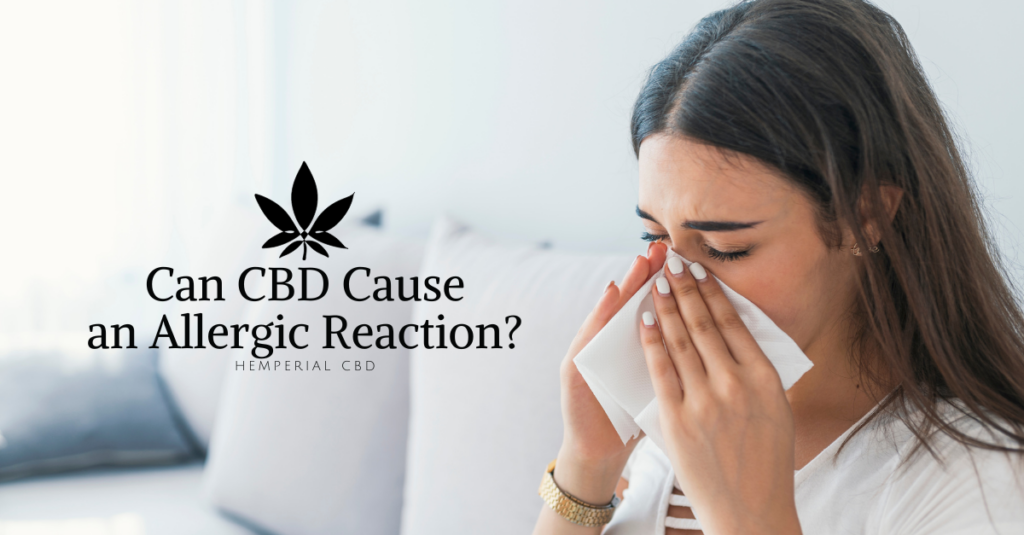Allergies are caused by an overly vigilant immune system that perceives potentially harmless substances as harmful to the body. Can CBD Cause an Allergic Reaction?
Allergies can cause itchiness, watery eyes, sneezing, runny noses, rashes, and other symptoms.
People can develop seasonal allergies to plant pollen or food allergies to specific foods, and since CBD oil is a supplement made from plants, some are beginning to worry if it, too, might result in an allergic reaction.
There have been some stories of people having negative reactions to CBD as it gains popularity and relevance. We cover everything there is to know about CBD and allergies in this post, regardless of whether they were brought on by the CBD or a subpar product.
We cover everything, from possible adverse reactions to CBD to using CBD oil to treat various sorts of allergies.
Overview of Allergies in Brief
Nowadays, allergies are more prevalent. Some telltale signs, such itchiness, sneezing, a runny nose, and occasionally difficulty breathing, can help you spot them.
However, what precisely causes allergic reactions?
The immune system, according to research, is what causes allergies. Normally, the immune system can distinguish between substances that won’t damage us and those that will, protecting us against the latter.
However, on occasion, the system misidentifies harmless substances as possible dangers and produces antibodies to combat these intruders. Every time the body comes into contact with the allergen, antibodies are released.
Foods with a lot of protein, such soy, wheat, and nuts, are frequently the subject of food allergies. Hemp seed oil may contribute to hemp allergies due to its high protein content. Hemp seed oil is not the most popular carrier oil for CBD extracts, though.
Here is all the information you need to know about CBD allergies.
Can CBD Oil Give You an Allergic reaction?
Although rare, allergies may be brought on by CBD.
Full-spectrum There is a chance that the pollen will get into the CBD formulation because CBD oil is produced from whole hemp plants. A person may come into touch with allergens as a result of this and develop an allergic reaction.
Pollen production in hemp plants is only possible in male plants. CBD oils are made from female industrial hemp plants, even though farmers also grow male and female hemp plants. This is because female plants produce flowers that are cannabinoid-rich.
For some pollen to be transferred into the CBD extract, there must be cross-pollination.
Nevertheless, little is understood about the potential impact hemp pollen may have on CBD. High-quality extraction techniques, however, might render its substance completely inert.
Terpenes in CBD oil have also been linked to allergic responses in studies. In people who are sensitive to them, terpenes like limonene and linalool have been known to cause skin rashes. Terpene allergies are uncommon, nevertheless.
Some consumers of full-spectrum CBD oils may develop an allergic reaction since they include a variety of terpenes.
Allergy to Hemp Seeds
High-protein foods can trigger allergies, as was previously indicated. For many CBD products, including creams, lotions, serums, and cooking oils, hemp seeds serve as the foundation. It should only be 100% fat when used in this manner. Hemp seeds are high in protein, however when they are handled differently (unrefined), some people may have side effects including hives and redness. Customers who have experienced significant negative responses to hemp seed oil should search for CBD oils dispersed in various carriers, such as MCT oil or olive oil.
What Are the Allergic Reactions to CBD?

Individuals with allergies to CBD may exhibit symptoms after breathing, touching, smoking, or ingesting goods containing CBD, according to the American Academy of Allergy, Asthma, and Immunology.
When a substance is perceived as a threat by the immune system, an allergic reaction occurs. The immune system will manufacture antibodies called Immunoglobulin E to defend the body against the ‘invader,’ which causes an allergic reaction.
Depending on the person’s immune system and the amount of immunoglobulin E in the bloodstream, different people will have these reactions. It’s possible for an allergic reaction to develop over time and not necessarily manifest itself upon initial contact with the allergen.
Since hemp plants are the source of CBD oil, most allergic reactions to CBD are comparable to those brought on by fungus and pollen. If you stop taking CBD, these symptoms ought to go away. The following are a few typical allergic reactions to CBD oils:
- Runny nose
- Sneezing
- Congestion
- Dry cough
- Itching
- Eye irritation
- Skin reactions
- Sore throat
Using CBD oil topically may potentially cause skin responses. CBD skin effects include:
- Blisters
- Dry skin
- Hives
- Redness
- Irritation
Let’s expand on a few of the symptoms mentioned above.
Can CBD Oil Make You Itch?
Depending on the type of pitching we’re talking about. Red, itchy eyes could be a sign of an allergy to CBD oil or any of the extra components, such as carrier oil, terpenes, flavorings, etc. The ideal is to have less components in your CBD oil. The only components of the base should be MCT oil and hemp extract. The majority of the time, high-quality CBD products do not cause allergic responses.
Although CBD may contribute to itching when applied topically to the skin, this may not always be the case. Make sure there are no skin irritants or potential allergens in the product by carefully reading the ingredient list.
At least two reports of itching following the use of CBD oil were detected, according to a 2019 study from the UK Medicines and Healthcare Products Regulatory Agency (MHRA). One patient who took an oral medication had urticaria, a severe skin ailment characterized by swelling, red welts, and excruciating itching. Another person who experienced itchy skin also utilized CBD topically and orally.
Can You Get a Rash From CBD Oil?
Full-spectrum CBD users hardly ever experience adverse reactions, however other kinds of CBD can give some people a skin rash. The FDA-approved medication Epidiolex may make this side effect more prevalent.
The prescribing label shows rashes as one of the most frequent adverse effects because the medication has undergone comprehensive clinical testing for both possible benefits and side effects. It also mentions itching and liver issues.
Anyone who takes Epidiolex or CBD oil and experiences these side effects should contact a doctor right away.
Can CBD Oil Cause a Negative Reaction?
In general, CBD is regarded as a safe substance.
The most recent analysis of the safety and negative effects of cannabidiol found that people tolerate it well. The review examined daily dosages between 300 mg and 1500 mg over the course of several weeks, but no serious or fatal adverse effects were discovered.
Despite this, large doses of CBD oil can result in a few minor side effects, such as:
- Dry mouth
- Dizziness
- Fluctuation of appetite
- Diarrhea
Additionally, CBD can interact with a variety of medicinal substances. Consult your doctor about adding CBD to your daily regimen if you take any medications. Along with setting the ideal dosage, doing this will assist you in avoiding harmful interactions. Seek out holistic medical professionals with knowledge in the CBD industry.
Is CBD Oil Effective for Allergies?

The ECS, your body’s main network for regulating neurochemicals, is supported by CBD. By creating its own cannabis molecules, the ECS maintains the balance of all of your systems and their organs (endocannabinoids).
Through ECS signaling, CBD promotes the body to create more of its own cannabinoids. Additionally, it supports the body’s ability to maintain their ideal levels in order to control key processes like the immune response.
How CBD oil may assist with allergies is as follows:
- CBD may bolster your immune system. Allergies are the outcome of an overactive immune system that mistakenly views harmless chemicals as possible danger. When you take CBD for allergies, it interacts with the immune system’s CB2 cannabinoid receptors to enhance cell-to-cell communication and support a strong immunological response.
- CBD produces significant anti-inflammatory effects. The anti-inflammatory properties of CBD are primarily responsible for its possible beneficial benefits on allergies. Again, endocannabinoid signaling enables CBD to prevent the generation of cytokines, which are inflammatory substances. The discomfort brought on by allergic reactions might be lessened by reducing inflammation.
- CBD has antimicrobial properties. You are typically more susceptible to illnesses if you have allergies. Full-spectrum CBD and terpene products The antibacterial qualities of CBD oil can be utilized to reduce the side effects of allergies. This is made possible by CBD’s interactions with the body, which help the body fight against real infections rather than attempting to get rid of erroneously detected invaders.
- CBD improves stress response. Allergies can be upsetting on a physical and psychological level. Because persistent stress lowers the immune system even more, an increase in stress might make symptoms worse. Regular CBD oil intake can assist you in overcoming the discomfort of sniffles, colds, coughs, and itching.
We examine how CBD oil might lessen certain allergies in the sections below.
Food Allergies and CBD Oil
By avoiding the food that triggers an allergic reaction, food allergies can be easily prevented. Hives, swollen lips, and mouth tingling are all typical signs of food allergies. When you get stung by an insect, you experience similar symptoms, including shortness of breath and swelling at the location of the sting. These symptoms are present in combination with food allergies.
Additionally, there is a chance of developing anaphylaxis, a condition that can be fatal and is characterized by a strong allergic reaction.
Because CBD is a supplement and not a pharmaceutical, it won’t be of any use during an anaphylactic shock.
However, CBD can reduce the stinging, swelling, and inflammation that are common signs of frequent allergies.
Using CBD Oil for Hay Fever
Seasonal allergy adverse effects may be lessened by CBD’s antimicrobial properties. High-strength full-spectrum CBD oils may help clear congestion by decompressing nasal passageways and opening up the sinuses. Seasonal allergies cause inflammation and increased histamine production, which makes it challenging to breathe, eat, drink, and speak without feeling irritated. According to recent studies, CBD oil may relieve these symptoms and the discomfort brought on by seasonal allergies.
The Advantages of CBD Oil for Allergies
Many testimonials from CBD users and associated studies show that CBD oil may treat allergies, even though scientists haven’t yet conducted trials that would examine the direct effects of CBD on allergies.
CBD may:
- Promote an anti-inflammatory response
- Block the release of histamine
- Reduce the symptoms of allergic reactions
According to a 2005 study, CBD may use a similar mechanism as antihistamine drugs to prevent the release of histamines. Many allergic symptoms, including asthma, sneezing, coughing, red eyes, and runny nose, are caused by histamine.
Inflammation is brought on by the body’s increased histamine levels. In addition to its propensity to suppress histamine release, CBD may also stimulate an anti-inflammatory response by preventing the production of cytokines that cause inflammation. Less swelling and irritability are consequently felt by persons after an allergic reaction.
Because of how CBD interacts with the endocannabinoid system, it has these health advantages. By enhancing the immune system through endocannabinoid signaling, CBD products may be beneficial for preventing allergies.
Having stated that, more clinical studies on humans are required to assess the effectiveness of CBD in treating allergies.
The best way to use CBD oil for allergies
CBD is offered in a variety of forms, including:
- CBD Oils: The most popular approach to supplement cannabidiol is using CBD oil. It contains a hemp extract and a carrier oil that increases the rate at which CBD is absorbed. It’s simple to use CBD oils; simply pour the desired dosage of CBD into the dropper that comes with them, place the dose beneath your tongue, and hold it there for about 60 seconds. The first-pass hepatic metabolism of the CBD will not occur because it will be taken directly into the bloodstream.
- CBD Capsules: If you don’t like for the earthy flavor of natural CBD oil, capsules are a decent option. Because each capsule contains a premeasured dose of CBD, this type of CBD also removes the element of guessing. They offer a covert manner to ingest CBD and are practical to carry around. However, the effects take 40–90 minutes to manifest since CBD must first travel through the digestive system.
- CBD Edibles: Products like honey sticks, candy, protein bars, and beverages fall under this category. Due to the fact that they provide a fun way to obtain your daily dose of CBD, many are turning to CBD edibles. Similar to capsules, the benefits of edibles take time to take effect since the liver must metabolize them. On the other hand, CBD lasts longer than vapes and oils since it enters the bloodstream gradually.
- CBD Vapes: The quickest and most efficient way to experience CBD’s advantages is through vaping. You can fill the tank with your preferred CBD e-liquid using the disposable vape pens or the reusable cartridges that are included. Anywhere e-cigarette vaping is permitted, you can vape CBD. With 56% of the CBD that is breathed being absorbed by the body, this type of ingestion also offers the best bioavailability of all consumption techniques.
- CBD Topicals: Topicals can be used as a healthy substitute for common creams. By interacting with the cannabinoid receptors under the skin, they treat localized issues like physical discomfort, redness, swelling, and itching. Always read a CBD topical product’s ingredients list to be sure there aren’t any irritants or allergens.
Dosage of CBD for Allergies
It’s reasonable to anticipate a dose schedule for CBD oil, but, to be quite honest, there isn’t a set amount that works for everyone.
Because each person is unique, so is how we each react to CBD. The appropriate dosage range can be influenced by things including weight, sex, age, metabolism, the severity of the symptoms, and the time of day.
The most common method for using CBD oil to enhance the immune system is as a daily supplement, and amounts of 10 to 50 mg per day are thought to be helpful. You might need to include more or less CBD in your routine, depending on your circumstances.
According to experts, beginning CBD dosage for new users should be between 1-6 mg for every 10 pounds of body weight. Even if you don’t notice any results right away, keep trying. In some cases, CBD may require longer time to make up for cannabinoid shortages and aid in the restoration of equilibrium in your body. You can experiment with different dosages for at least a week, noting how you feel after each dose to monitor your progress and modify the CBD dosage as necessary.
Summary of CBD oil and Allergies
Globally, millions of people suffer from seasonal and food allergies. There have been a few documented clinical instances of itching, rashes, sneezing, coughing, and other common pollen allergy symptoms, despite the fact that allergic reactions to CBD oil are incredibly rare.
Using CBD topically can also cause an adverse reaction, particularly if the product also contains terpenes, plant-based extracts, or other substances to which you may be hypersensitive.
You might develop a food allergy if you’re allergic to other high-protein plant foods, including soy, wheat, or nuts, and your CBD oil is infused in hemp seed oil. Thankfully, the majority of premium CBD oils are dissolved in MCT oil.
On the other hand, a number of studies have praised CBD for having immunomodulatory and anti-inflammatory effects. In addition to reducing inflammation, CBD also has the ability to prevent the release of histamines, which lessens the prevalence of allergy symptoms.
It is up to the user to decide whether or not being allergic and using CBD oil may coexist until researchers have sufficient clinical proof addressing the relationship between CBD oil and allergies.
